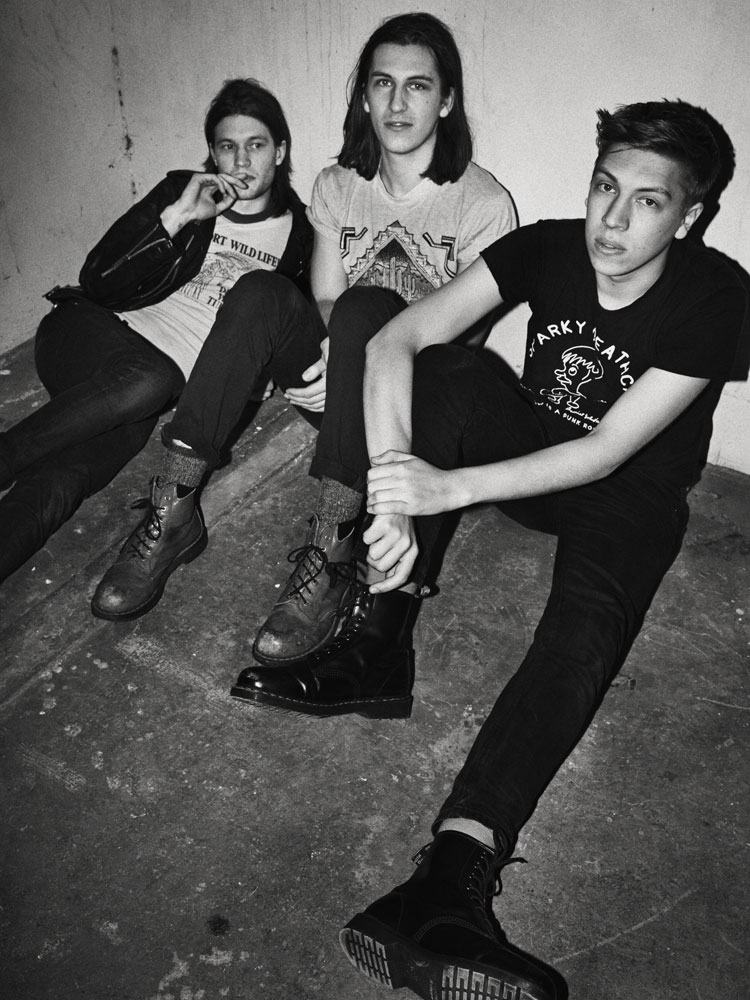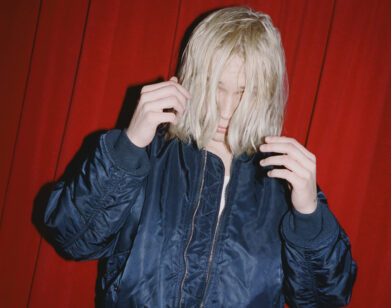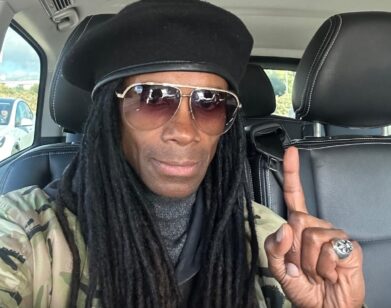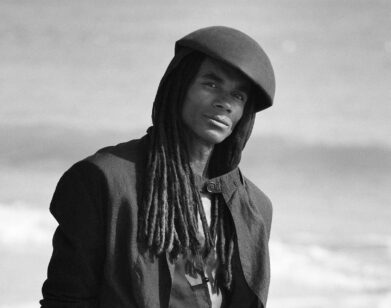Defining Drenge

Although it is filled with self-described “woozy guitar,” reverbs, and heady drums, Drenge’s sophomore album Undertow (out via Infectious) also features subtle, catchier, pop-leaning moments. With songs such as “Never Awake,” and lyrics like, “I’m losing my mind / I don’t know where to begin / How ’bout you stay the night?” the band presents a slight departure from its 2013 self-titled debut.
For their debut, Eoin and Rory Loveless—the brothers behind the music—wrote and recorded songs while living separately from one another, creating a buzz-worthy record, despite its lack of a thematic narrative. Over the past few years, however, the brothers were with each other every day on tour. For the last six months they have even called each other roommates, having moved from their small hometown of Castleton, England, to the nearby city of Sheffield. The Loveless brothers wrote and recorded Undertow more confidently than Drenge, and also introduced a third band member, Rob Graham, and created a dialogue with—rather than just taking direction from—their producer, Ross Orton (The Arctic Monkeys, M.I.A., among others).
On Friday, just before Undertow‘s release, we spoke with Eoin over the phone. He was at home in Sheffield packing for a show (“It’s not a good thing to do the weekend your album comes out!”); we were in New York.
EMILY MCDERMOTT: What do you think the biggest change has been between your debut and Undertow? How do you think you and your brother grew as a band?
EOIN LOVELESS: Me and Rory hadn’t really seen much of each other before. We were living apart and found ourselves in the studio after not spending much time with each other. The [recording] sessions were sprinkled in between time when I was away studying and he was at college. Then, after finishing recording the first album, we toured and saw each other all day every day for about two years. I feel like we know each other a lot more and that’s evident in the songwriting. They’re songs we feel very comfortable with and they came a lot quicker than we could’ve imagined because we’re both on the same page.
MCDERMOTT: Is songwriting a collaborative process?
LOVELESS: It varies from song to song, but usually I come in with some very, very skeletal ideas and we sit down and talk about structuring. That’s where Rory really excels—taking parts of songs and putting them together and making sure that there’s not nine choruses in one song or stuff that’s repetitive. He edits everything down before we go into the studio, and then he edits it even further down.
MCDERMOTT: “Side by Side” is one of my favorite tracks on the album. Can you talk a little bit about it? Is there a story behind it?
LOVELESS: It’s my favorite track on the album too. It’s about two people making a decision to never see each other ever again, and the people that I’m referring to are kind of the characters in a getaway movie.
We had some breakfast in this café down the road, called Diyafa, and “diyafa” is a code of the Bedouin, where, if anyone comes upon your camp, then you have to treat them really well. Even if they’re an enemy, you have to give them a bed and some food. That idea carried through into the song. It was [also] the first time we ever tried anything out with our new band member, Rob. We all sat down in a room and we had this thing that we were quite happy with.
MCDERMOTT: The last album was written over a period of years and you’ve said you were surprised that the songs all fit together so well. Was it a more comfortable process this time around? Did you feel more confident?
LOVELESS: Yeah, it felt comfortable to write about the recurring characters, themes, identities, locations, and events that come up in the songs on this one. In a musical sense, it was a chance to explore more forms of songwriting. We felt comfortable writing choruses and we were proud of the choruses we worked on. There are some really heavy pop moments that were a bit of a surprise—I was just surprised that we could write stuff like that. Lyrically, I think I looked at the album as [a whole], rather than 11 separate tracks. I tried to treat it all as one narrative or a collection of short stories that fall into each other, whereas on the first record, I feel like each song is individual. There’s only one reference to another song on the album, and that was just a really clumsy thing I did. At the end of writing lyrics I was like, “Oh no, the album has got to tie up!”
MCDERMOTT: You have to put something in there to put it all together…
LOVELESS: Yeah. [laughs] That exposes me as a really fraudulent songwriter who forces references in…
MCDERMOTT: How did working with Ross [Orton] come about? He has some pretty impressive credits to his name.
LOVELESS: He produced our last record, which was a bunch of sessions we’d done together. He was the first person that had ever properly, considerately recorded our band. Me and Rory were aware of his work from when we were teenagers; to me, he was the first record producer I was properly aware of. When I found out that we were recording with Ross for the first time I was very scared, we were both very scared. The the first four tracks of the first album are the sound of me and Rory in absolute terror. We didn’t say a single word those days; we’d just go in, sit there with our mouths shut, and let him do his thing. Working with him this time around, it was better because he’s more of a mate now and we could hang out.
MCDERMOTT: So I know you watch Game of Thrones, but haven’t read the books, and that you don’t really read that much in general…
LOVELESS: I read a bit, but I don’t really pick up books. It’s more articles on the net that I read, rather than novels. I’ve tried to watch as much House of Cards as I can before I go on tour. I’m super addicted to that. It’s not long until Game of Thrones starts again!
MCDERMOTT: When you’re on tour, what keeps you grounded and from going insane?
LOVELESS: [laughs] There’s not a lot. I call my girlfriend everyday and talk about, you know, “How’s your day?” or, “How was the gig?” That’s a way of keeping in touch with home. I’m also trying not to drink on this tour so that will keep me really grounded… I’ve developed a really obsessive taste for coconut water. There’s so many different types. When I get into something I just become obsessive about it. It’s horrible! In The States I drank root beer all the time. I liked specific brands and I took photos of each root beer that I drank and put it on my Instagram. Coconut water is my U.K. equivalent; they don’t really do root beer in the U.K.
MCDERMOTT: That’s so funny. I hate root beer, so what’s the best one you had when you were here?
LOVELESS: I liked Virgil’s, that’s my go-to root beer. Then I did have one that was really amazing, I think it was called Buckin’ root beer—I picked it up at a deli in Seattle where they had an entire fridge full of independently brewed root beers. It was absolute torture because there were so many! There was Judge Wapner root beer… really niche, small-time breweries putting out root beer.
MCDERMOTT: I didn’t even know those existed.
LOVELESS: [laughs]
MCDERMOTT: How would you describe your philosophy towards music?
LOVELESS: Probably kind of quite self-satisfying in terms of I only try and write stuff that I would listen to if I wasn’t in my band. I’m trying to please the Drenge fan in me. At the end of the day, I’m just trying to please the music fan that I am. I love listening to music; I’m constantly listening to new records. Whatever interests me at the time, I’ll try and write songs that fulfill that.
UNDERTOW IS AVAILABLE NOW. FOR MORE ON DRENGE, VISIT THE BAND’S WEBSITE.






